#i know i'm going to be able to obliterate stage 2... i just have yet to even be able to try yet because FUQ STAGE 1 lol
Explore tagged Tumblr posts
Text
Time to start leveling up the HELL out of Caleb's violet cards because VIOLET MYTH COMPANION, HERE WE COME!!!!

#now i can finally freaking beat open orbit 110 stage 1 lol#I gave up trying to brute force it until caleb's myth companion was released#AND HE'S HEREEEE#love and deepspace#ash rambles#i know i'm going to be able to obliterate stage 2... i just have yet to even be able to try yet because FUQ STAGE 1 lol
10 notes
·
View notes
Text
You know what? Fuck it. It's anniversary. Treat yourself.
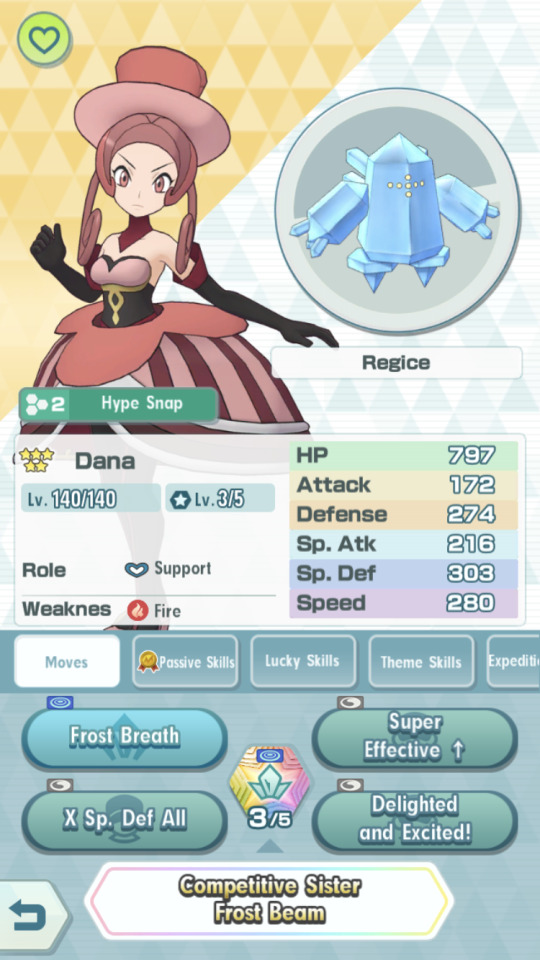
We're maxing out Best Chatelaine.
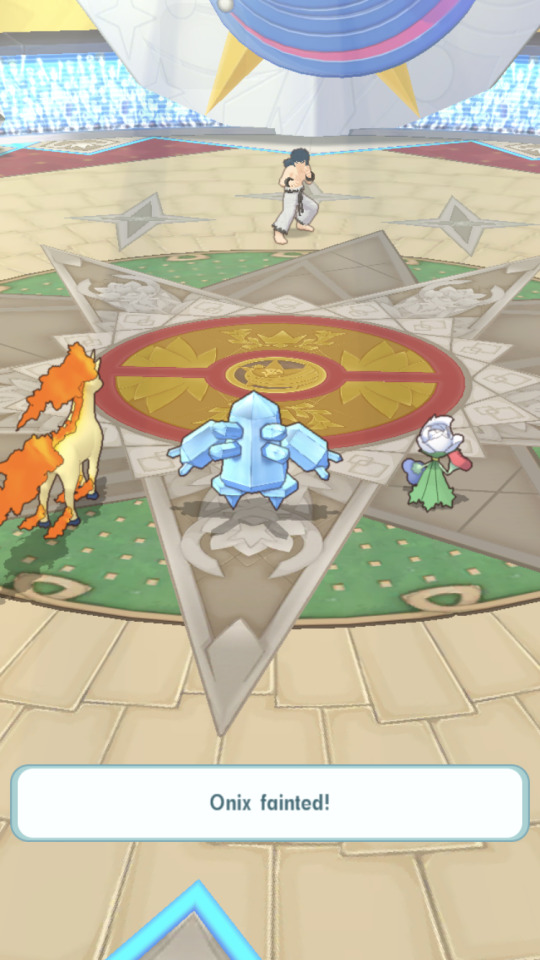
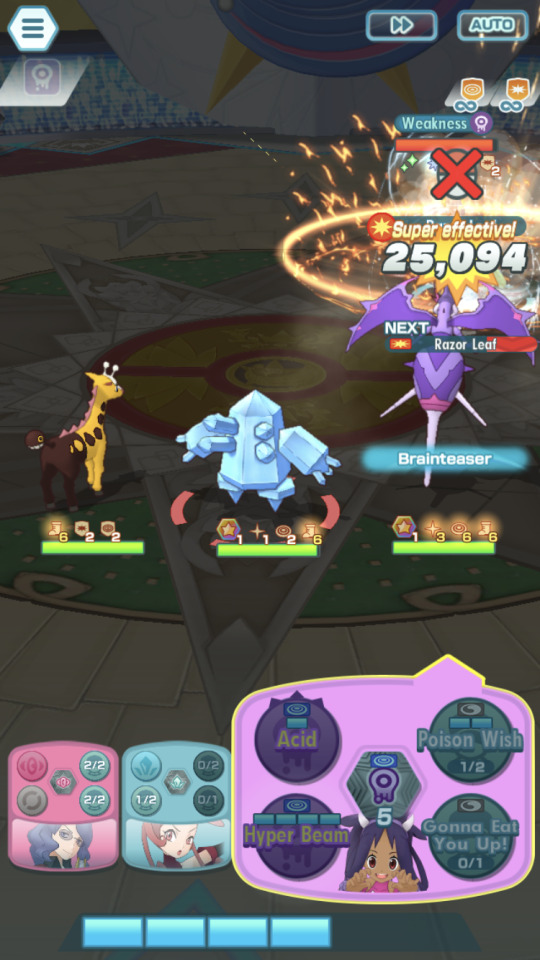
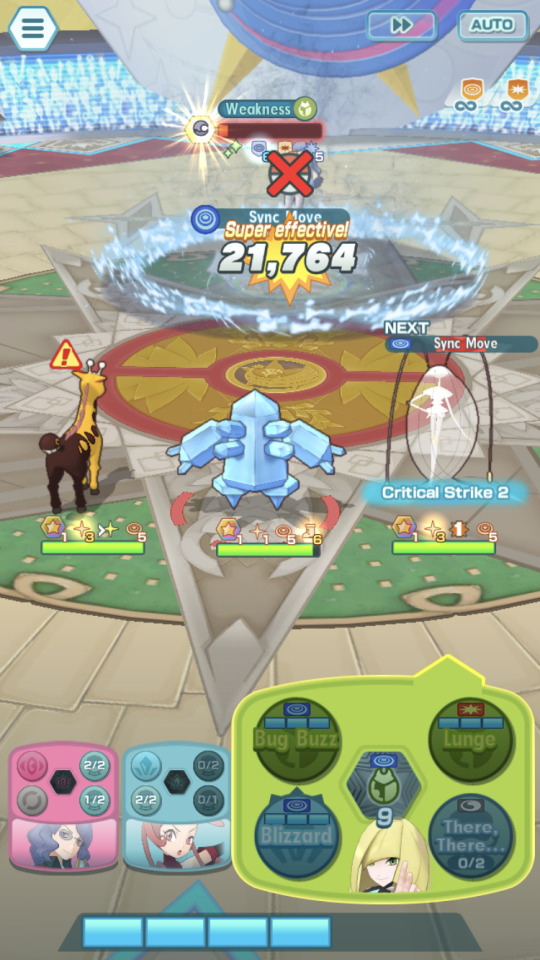
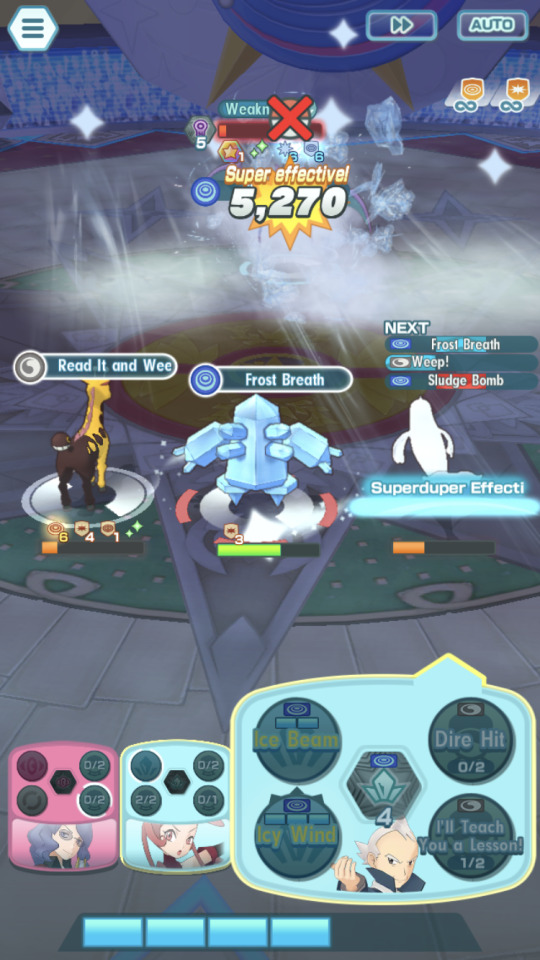
General Overview Ohooooo man. Okay. Big fan of this one. Obviously personality clicked, I do have a type, but I'm kinda loving her kit too.
Dana's obvious benefit is SEUN, which is...I have mixed feelings. I think it's simultaneously really good, and over-hyped. Really good because a huge 50% bonus, which I believe is multiplicative, applied for an EX sync nuke or heavy DPS shot, is fantastic. But it's only applicable on-type, which is generally the least important way to deal damage in the Gauntlet/High Score meta. This is part of why I think we need more pairs with two attacking types. SEUN with a potential super-effective coverage move would be really good. But as it stands, a lot of options can't make good use of it.
Moreover, 1/5 Dana encapsulates an issue with SEUN appliers. Specifically, they tend to make for bad offense buffers. Red and Jasmine have crit rate, even though one does it better than the other, and some arguable benefits that are inconsistent at best and insufficient at worst. Dana takes this a step further by boosting no offensive stats at 1/5. You get SEUN, and only that. But pairs that cap all relevant offenses fast enough for that to matter tend to be so good that the on-type modifier is irrelevant. It just doesn't accomplish much.
3/5 Dana is an entirely different beast. Team Sharp Entry is a divine skill that saves a turn off any self-buffer with +2 crit. Which is a lot of them. Hype Up on her attack, especially combined with Cold Snap, is divine. Not only does she now have the potential to disrupt an action, she's buffing special attack routinely while doing it. On physical stages, Dana has literally nothing better to do but spam Frost Breath, which allows her to rake up the special attack boosts for the team easily. At 20/20, I admit I had zero issues keeping her alive, without ever touching X Sp Def All. First Aid 4, combined with a Max Potion/Damage Guard effect on her trainer move, makes her more than sturdy enough. SEUN applications are great, but two are more than sufficient in most scenarios.
I didn't do this, but another fun angle is that she can boost both defenses and has Synchro Healing. So she's a great stall support as well. Girl is versatile.
Vs. Bruno It's a bad picture because I was frustrated and just glad to be done. Gardenia is stupid frail, so any time he's set to use two Bulldoze, you have to take a turn early on to throw TM on Gardenia instead and hope Dana can handle it (she can). But then you run into the issue of Gardenia needing sun up or she loses special attack, and her missing sync crit, etc etc etc. She's really frustrating. Gardenia kinda sucks.
Vs. Will Poison is fairly hard to shop for, but Dana has one extremely funny option. H!Iris gets +4 Sp Atk/+2 crit, and is therefore perfectly salvaged by Dana. Lucian just makes the team invincible at this point, and covers all needed gauge concerns. This is a really easy setup to take -2 sync cooldown parameter as well, because Iris will obliterate this team. Following that, second SEUN on Hyper Beam, which can combo into Iris getting Super Victory for yet another, and just blasting a stage into powder.
Vs. Karen This is more a showing of how SEUN can offset lower offense boosted stats, at least in part. +3 Sp Atk on Lusamine with SEUN is more than enough to eviscerate the sides, and Lusamine only needs two trainer moves with Team Sharp Entry in play, so she can focus on pure sync power. This was a really clean win, despite how much Sp Atk Lusamine seemed to need. Dana was able to provide.
Vs. Koga There is an ice stage! Initially I was going to do Ghetsis or something, before realizing (1) accuracy issues, and (2) not a great showing of Dana's abilities specifically. I then considered BP Candice, before realizing mine is EX. So I ran Pryce. Who is not EX. We did eat the opponent's sync, Pryce absolutely cannot DPS his way out of this. He did get a denial thanks to SEUN, but I messed up the gauges and it caused problems. I don't know that it made enough difference. The point is, she carried non-EX Pryce. It's not quite Irida, but I will gladly take this.
1 note
·
View note
Text
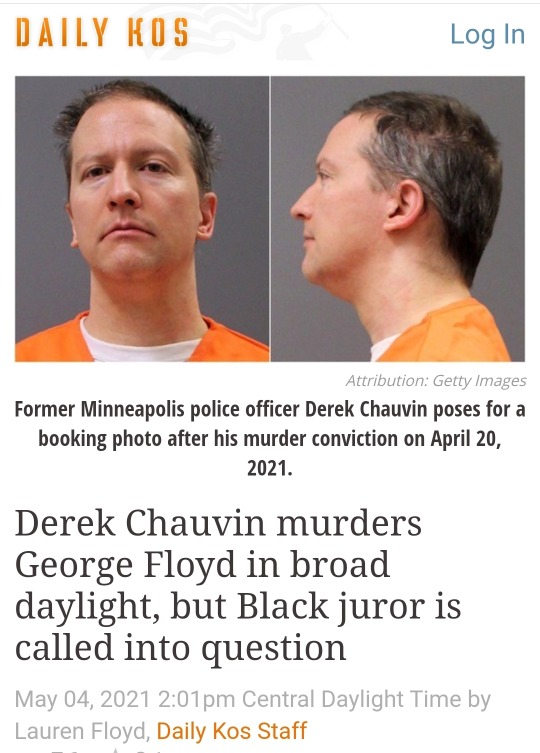
Convicting a murderous cop has its consequences. The integrity of a juror in the trial of former Minneapolis police officer Derek Chauvin is being called into question because the juror attended a march for Dr. Martin Luther King Jr. last August, CBS-affiliated WCCO reported on Tuesday. Floyd’s family spoke at the March on Washington, which was intended to commemorate the 57th anniversary of the civil rights leader's famous "I Have a Dream" speech. It also included a voter registration rally, which Brandon Mitchell, the juror in question, told WCCO was the reason he attended. His attire at the event, however, is now being scrutinized after he was photographed in a T-shirt with King's image and the words, “Get Your Knee Off Our Necks,” and “BLM,” which Mitchell explained were broader references to the circumstances of 2020.
“It was huge to get people geared for voter turnout, so being a part of that, being able to attend, you know, the same location where Martin Luther King gave his speech was a historic moment,” Mitchell told WCCO. “Either way, I was going to D.C. for this event, even if George Floyd was still alive.” Floyd is not alive, and don’t for one second let Chauvin’s apparent desperation to get away with murder obscure the fact that Floyd is not here to see his daughter grow up because of Chauvin. Not Mitchell or any other member of the jury.
Chauvin, who is due for sentencing at 2:30 PM ET on June 16, was convicted of second-degree murder, third-degree murder, and second-degree manslaughter last month. Several clips of witness video presented at trial showed him kneeling on the neck of 46-year-old Floyd for more than nine minutes on May 25, 2020, outside of the Cup Foods corner store in Minneapolis. That video went viral and ushered the case onto an international stage, fueling anti-racism and anti-police brutality protests.
Still, Mitchell, juror No. 52 in the trial, told CBS This Morning co-host Gayle King he didn't feel pressure to reach a guilty verdict "at all … And I don't think any of us felt like that. I for sure did not. I for sure did not feel like that,” Mitchell said. “The pressure more so came from just being in the room and being under stress. But it wasn't pressure to come to A guilty verdict." He told King he was stressed about having to come into the courtroom and watch a Black man die every day. “That alone is stressful,” he said. “Coming in each and every day and having to watch somebody die is stressful enough by itself. So anything outside of that was secondary, just because as a human, it's natural to feel some kind of way as you're watching somebody in agony.”
Chauvin's defense attorney, Eric Nelson, brought up the question of just how much outside opinions of the case might be affecting the trial when he didn’t like how Rep. Maxine Waters answered an interviewer's question about what demonstrators should do if Chauvin isn't convicted. “We’ve got to get more confrontational," she said. "We’ve got to make sure that they know that we mean business.” With that, Nelson brought up the possibility of a mistrial and said the jury should have been sequestered from the start of the trial. “My phone gives me alerts on things that just happened. I mean you can’t avoid it, and it is so pervasive that I just don’t know how this jury can really be said to be that they are free from the taint of this,” Nelson said. “And now that we have U.S. representatives threatening acts of violence in relation to this specific case, it’s mind-boggling to me judge.” Judge Peter Cahill admonished Waters but ultimately ruled that her remarks weren’t grounds for a mistrial.
Civil rights attorney Ben Crump, who represents the Floyd family, told TMZ that Mitchell's interview "completely obliterates" any claim from the Chauvin defense that public opinions outside the courtroom influenced the jury.
Rachel Moran, a law professor from the University of St. Thomas, told WCCO an important consideration in the case is whether lawyers did their job in investigating jurors. Mitchell said in a questionnaire WCCO obtained that he never took part in a protest about police brutality and that the phrase Black lives matter simply means Black people "want to be treated as equals and not killed or treated in an aggressive manner simply because they are Black.”
“If he had been asked about it and he tried to hide it, that could be an issue,” Moran said. “But at this point, I don’t see anything, any evidence that he tried to hide it.”
The attorney added that “it’s really important for the viewers at home to know it’s really hard to overturn a conviction, and courts are especially reluctant to interfere with the jury deliberation process.”
Read the transcript of King’s interview with Mitchell from CBS News:
King: 31-year-old Brandon Mitchell was known only as juror #52, and he joins us now. Brandon, we're really glad to see you because all of us wanted to know what happened. So I'd like you if you could, please take us inside the room. I think we were surprised that you're 12 strangers, you didn't know each other, you go in the room — what's the process, and how were you able to reach a verdict so quickly? And good morning!
Juror Brandon Mitchell: Yeah. Absolutely. Good morning to you. First, I want to send my condolences to the Floyd family.
King: Yes.
Mitchell: But when we walked into the deliberation room, the first thing we did is we voted on whether or not we wanted to have our mask on. We made that kind of an ice breaker to get going. We voted to not have our mask on. We took our masks off. We voted for a foreperson, and from there we went straight into the manslaughter charges and took a preliminary vote before doing a final vote on those charges.
King: What was the preliminary vote?
Mitchell: The preliminary vote was 11 of us were already — we were already on board for guilty for the manslaughter. One person was still unsure. And we just went over it as a team, as a group. Each person kind of went down the line on why they thought it was guilty. We did another vote maybe 40 minutes later after we went through everybody, and everybody was on the same page for the manslaughter. It happened really quickly.
King: Did you do that with each of the charges? Is that what you did, took a vote on each of the charges?
Mitchell: Yeah, absolutely. Each charge we did a preliminary vote to see where we were at, if there was anybody that was not on board yet or was unsure. Then we would go around the room, everybody kind of speak on what they think is necessary to speak on. We went over maybe a little bit of the evidence. And then we'd come back with a final vote whenever we thought it was a suitable time.
King: What was the one person unsure about, Brandon?
Mitchell: I think it was just like, the terminology. So within the instructions, some of the terminology can be a little tricky, because it's legal jargon. And so sometimes some of the words can be interpreted differently among people. It was just they wanted to do their due diligence and make sure that they were coming out with the right verdict that they believed in. So they were hung up on a few words. We went through the definitions that were given to us and kind of broke it down from different perspectives to get everybody on the same page.
King: Was there any particular witness that moved you and moved the jury that you said, okay, we're deeply affected by 'fill in the blank'?
Mitchell: So I think as a whole jury, I think Dr. Tobin was the biggest, the most influential witness out of everybody. For me personally, Donald Williams was another person. So Donald Williams and Dr. Tobin --
King: That's the fighter, yeah. The mixed martial arts fighter.
Mitchell: Yeah, so him early on, I felt he set the tone for the rest of the trial. And then when Dr. Tobin came, with him speaking so scientifically but also making it understandable for everyone along with the exhibits that he came with, I thought he just broke it down in a manner that was easy for all the jurors to understand. And I didn't think there was any way to — for the defense to come back after that. I was like, to me, the case was — it was done at that point almost.
King: Did you feel pressure because you knew the world was watching? That, you know, we have to reach a guilty verdict here?
Mitchell: Not at all. And I don't think any of us felt like that. I for sure did not. I for sure did not feel like that. The pressure more so came from just being in the room and being under stress. But it wasn't pressure to come to A guilty verdict.
King: What were you all stressed about?
Mitchell: We were just stressed about just the simple fact that every day we had to come in and watch a Black man die. That alone is stressful. Coming in each and every day and having to watch somebody die is stressful enough by itself. So anything outside of that was secondary, just because as a human, it's natural to feel some kind of way as you're watching somebody in agony.
King: Yeah. I can't imagine, Brandon, what it was like to be able to watch that tape day after day after day, the way you all did.
Mitchell: Yeah. It definitely had its impact on me. There was a few days where I was like, I don't know how I'm going to make it in this next day, especially me as a Black man. And a larger black man, I'm about 6'4", 250 pounds. And some of the testimony is like saying how size can be considered like, you know, is it a risk or threat. Whereas me, I'm a gentle giant. Stuff like that, that affects me in a way that — it's weird. I don't know if it affects anybody else the same way.
King: I understand. I understand what you're saying. How did you all feel about Derek Chauvin, the fact that he did not take the stand? Would that have made a difference to you? We'll never know, but do you think it would have made a difference?
Mitchell: It possibly — it possibly could have. We did talk about, you know, the fact that he didn't. Somebody had brought it up, like they wished he would have, they would have liked to have heard from him. But since it wasn't part of the case, it just is what it is. But yeah, I mean, anything brought in or not brought in, it could have possibly affected it either way. Either way I can't say it would have changed the outcome, but it's a possibility for sure.
King: Do you worry about your safety now? This was such a controversial case. We now know your name, we now know what you look like, we now know that you said you're a large man. Do you worry about your safety?
Mitchell: No, not at all. Not at all. I'm a person that kind of thrives in the positives. So I'm not too much concerned about that. Nor do I dwell on —
King: —the what if's—
Mitchell: —on negativity like that. Yeah, the what if's.
King: And he's going to be sentenced June 25. What do you think is the proper sentence for him, for Derek Chauvin? He's facing up to 40 years.
Mitchell: Yeah. I couldn't say what the proper sentencing would be. You know, I think we came up with the right verdict. You know, guilty on all charges. And you know, I'll let the judge do what he does.
King: All right, thank you very much. We really wanted to hear from you today. It's been a fascinating case that we've been watching.
Mitchell: Yes, thank you.
1 note
·
View note